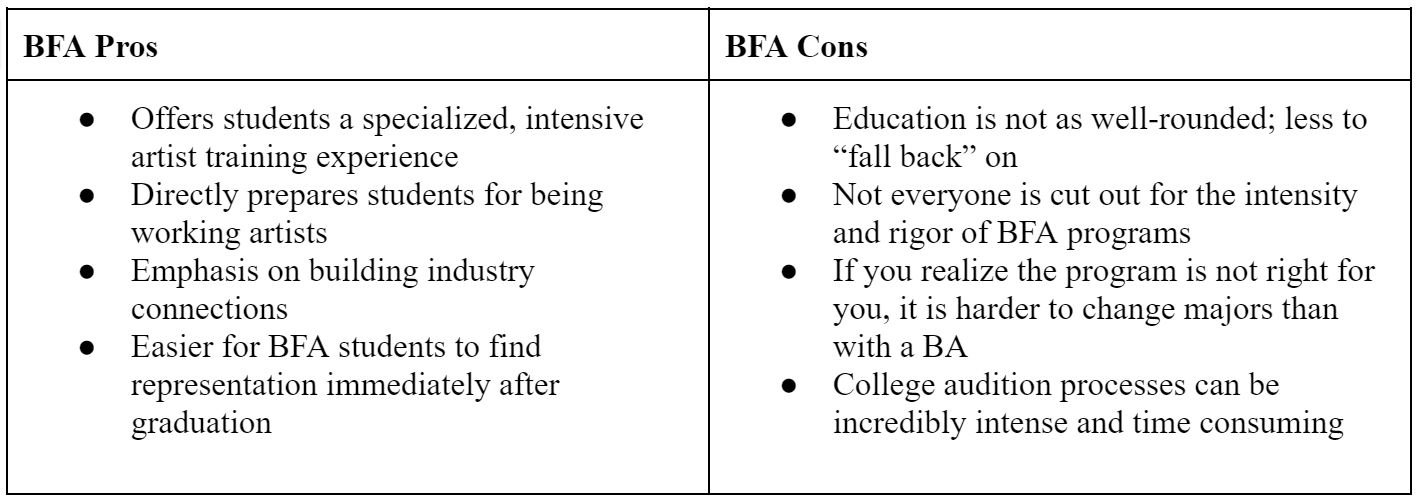BA vs. BFA: A Comprehensive Guide
So, you’re an actor, an artist, or a dancer, and you’re ready to pursue your dreams at the collegiate level. How exciting! But with so many programs out there, how will you choose where to apply?
The key question to consider as you build your college list is as follows: should I pursue a BA (a Bachelor of Arts degree) or a BFA (a Bachelor of Fine Arts degree)? There isn’t a right or wrong answer, and many applicants apply to both program types. But let’s talk through the ins and outs of this BA vs. BFA debate so you can navigate the application and audition process with confidence and ease.
What is a BA?
A BA, or a Bachelor of Arts, is a degree rooted in the study of liberal arts. A student can pursue a BA in subjects like History and English, as well as subjects like Theatre or Art Theory. Within each of these BA degrees, students will have:
Courses that align with their major (i.e. Acting I, Fundamentals of Drawing, History of the World Wars)
A core curriculum that offers students a general liberal arts education (i.e. Statistics 1, French Language and Literature, Writing Workshop, Science in Society)
Room in their schedule for elective courses, or for another major or a minor.
If you want to have a well-rounded education with opportunities to take electives, double major, or minor, a BA degree could be the degree for you.
Interested in pursuing theater? Here are some of the best BA Theatre programs.
What is a BFA?
A BFA, or a Bachelor in Fine Arts, is a more specialized degree that puts a much greater emphasis on the student’s creative trajectory. While most BFA degrees still require some general core requirements, the course of study is much more weighted towards skill-building classes that will directly prepare the student to professionally pursue their craft. Within a BFA degree, a student will:
Develop their technique (i.e. Acting I, Drawing/Imaging, Ballet I)
Take courses in production, performance, or studio courses (i.e. Production Practicum, Vocal Music for Dancers, Artist & Studio)
Present their work in a public-facing senior showcase or gallery for industry professionals
Opportunities for showcasing work are a major draw to BFA programs as it connects students with real-world opportunities, and increases their chances of being represented by an agent or manager immediately after graduation.
If you crave a specialized, pre-professional college experience, a BFA program might be the best fit for you. Interested in an Acting BFA? Here’s what you’ll need to prepare.
Bonus! What’s a BM?
Another degree type is a BM, a Bachelor of Music. A BM is exactly what it sounds like: a degree in the study of music. This could be a Vocal Performance degree, a degree in an instrument (i.e. Violin), or a Musical Theater degree that puts a greater emphasis on singing. So if you are a musical theater person, your college research might expand to include BM degrees in addition to BAs and BFAs!
Let’s Compare: BFA vs. BA Pros and Cons
Of course, this is a general outline; each school’s program has different requirements, so it is essential to do school-specific research to see what each application and audition process entails.
I want to learn more!
Applying to programs of this nature can be stressful and time consuming, whether it's piecing together a portfolio you are proud of, compiling arts supplements, or embarking on a multi-step college audition process. We want to make ourselves a resource to help you through this exciting, and often overwhelming, time.
Schedule a free consultation today, and we’ll help you figure out which programs will be the best fit and help your individual artistry shine throughout your whole application!



